The 10 Best Marketing Books for Growing Any Business

When I started learning digital marketing, books were the most useful tools for helping me self-educate and get through the early novice stages. There were some blogs that were useful, but for the most part, the amount of artificial complexityand bad info in blogs was so much harder to cut through as a novice that books provided more consistently high-value information.
Four years since first diving into digital marketing, some books have risen to the top as being consistently useful and oft recommended, while others have been left by the wayside.
Whether you’re getting started learning about marketing, or have been doing it for years and simply looking to improve your mental models for it, these are the 10 best books I’ve found.
The 22 Immutable Laws of Marketing by Al Ries

Get it on Amazon. Read my notes.
This is absolutely where you need to start in your marketing reading list. Ries distills most of the core mental models of good marketing into 22 rules that you can constantly refer back to and check your plans against, and that most other information on the subject ends up being derivative of. If you haven’t read it yet, definitely pick up a copy.
“There are laws of nature, so why shouldn’t there be laws of marketing? You can build a great-looking airplane, but it’s not going to get off the ground unless it adheres to the laws of physics, especially the law of gravity. You can build an architectural masterpiece on a sand dune, but the first hurricane will undermine your creation. So it follows that you can build a brilliant marketing program only to have one of the immutable laws knock you flat if you don’t know what they are.”
Traction by Gabriel Weinberg and Justin Mares
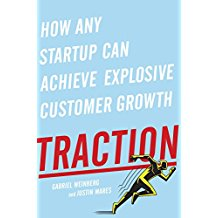
Get it on Amazon. Read my notes.
Hands down the best startup marketing book out there, and the first one I recommend to people who want to get into startup marketing. Weinberg and Mares break down the traction (marketing) channels that companies have available to them today, and how you can start pursuing and experimenting with them. I still use some form of the Bullseye Method in it for thinking about digital marketing, and the list of channels to brainstorm new ideas.
“ If you’re starting a company, chances are you can build a product. Almost every failed startup has a product. What failed startups don’t have is enough customers.”
Different by Youngme Moon
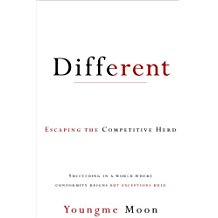
Get it on Amazon. Read my notes.
The message of this book is extremely important: do NOT try to make sure your weaknesses are up to par as everyone else, love your weaknesses and accentuate your strengths. Be different. Too many businesses constantly try to patch their weaknesses to get closer to normal, but the best way to stand out is to be clear about what you do and do not do. There shouldn’t be budget Porsche’s, IKEA shouldn’t assemble for you, Apple shouldn’t have a cheap laptop.
“The truth of the matter is, true differentiation—sustainable differentiation—is rarely a function of well-roundedness; it is typically a function of lopsidedness. The same can be said for excellence. If you were to meet a brain surgeon who also claimed to be a pediatric orthopedist who also claimed to be a specialist in Botox treatments, you’d likely view all of his credentials with skepticism.”
Words that Work by Frank Luntz
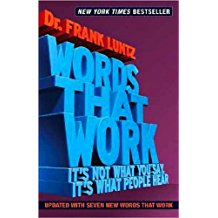
Get it on Amazon. Read my notes.
This isn’t explicitly a marketing book, but it’s one of the best books on speech and copywriting. It’ll take your awareness of political messaging to new heights, and give you a greater ability to influence others through your word choice alone. If you want to improve your marketing copy and how you communicate the value of your product to potential customers, this is an excellent place to start.
“ You can have the best message in the world, but the person on the receiving end will always understand it through the prism of his or her own emotions, preconceptions, prejudices, and pre existing beliefs. It’s not enough to be correct or reasonable or even brilliant.”
Made to Stick by Chip and Dan Heath
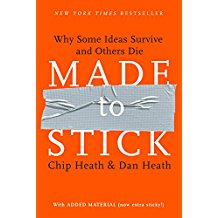
Get it on Amazon. Read my notes.
The best book I’ve found on crafting a memorable message. Useful for speaking, marketing, writing, any time you need to make people listen, believe, and act. This builds on the lessons in Words that Work, since learning how to make an idea “sticky” will be essential for successfully marketing anything.
“We wanted to take apart sticky ideas— both natural and created— and figure out what made them stick. What makes urban legends so compelling? Why do some chemistry lessons work better than others? Why does virtually every society circulate a set of proverbs? Why do some political ideas circulate widely while others fall short?”
Zero to One by Peter Thiel
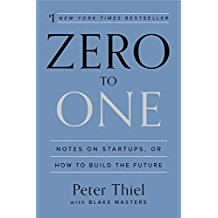
Get it on Amazon. Read my notes.
This is, in my mind, the best book on starting a real COMPANY. Lean startup is great for something that won’t die, but this is the book on making something that lasts. In the context of marketing, it explains how important product is, and how building something that solves a real need and creates a big change in someone’s life is the most effective marketing there is. You can throw all the ad money and content you want at something, but if it’s not a great product, it won’t matter.
“The paradox of teaching entrepreneurship is that such a formula necessarily cannot exist; because every innovation is new and unique, no authority can prescribe in concrete terms how to be innovative. Indeed, the single most powerful pattern I have noticed is that successful people find value in unexpected places, and they do this by thinking about business from first principles instead of formulas.”
Contagious by Jonah Berger

Get it on Amazon. Read my notes.
In a similar category as “Made to Stick,” Contagious explains why some ideas catch on and spread and others don’t. It’s loaded with good stories that you’ll remember and be able to reflect on, as well as some ideas and strategies for making your own message more memorable and contagious.
“Certain stories are more contagious, and certain rumors are more infectious. Some online content goes viral while other content never gets passed on. Some products get a good deal of word of mouth, while others go unmentioned. Why? What causes certain products, ideas, and behaviors to be talked about more?”
Blue Ocean Strategy by W. Chan Kim
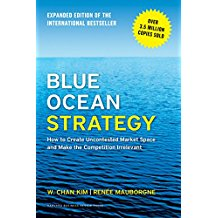
Get it on Amazon. Read my notes.
The core mental model from the book is to create blue oceans, not fight in the “Red oceans.” The figures are useful for determining how to find your blue ocean strategies and capitalize on marketplaces and ideas that haven’t been completely used up yet. Similar to Different, it encourages you and provides ideas for creating your own brand identity instead of copying everyone else.
“Blue oceans… are defined by untapped market space, demand creation, and the opportunity for highly profitable growth. Although some blue oceans are created well beyond existing industry boundaries, most are created from within red oceans by expanding existing industry boundaries… In blue oceans, competition is irrelevant because the rules of the game are waiting to be set.”
Influence by Robert Cialdini
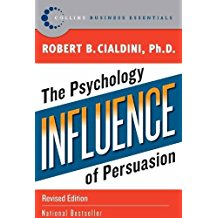
Technically a book on persuasion, but the 7 elements of influence end up being useful for designing your marketing as well. You may already know much of it since it’s become standard knowledge at this point, but the book does a good job of refreshing the elements and helping you understand how they work and how to use them.
“It is odd that despite their current widespread use and looming future importance, most of us know very little about our automatic behavior patterns. Perhaps that is so precisely because of the mechanistic, unthinking manner in which they occur. Whatever the reason, it is vital that we clearly recognize one of their properties: They make us terribly vulnerable to anyone who does know how they work.”
The Boron Letters by Gary Halbert

Get it on Amazon. Read my notes.
Likely the only copywriting book you’ll ever need. It’s fantastic and extremely readable, carrying you along with how fun of a conversation it is between a man and his father writing from prison. The way the book and letters are written themselves is as much a lesson as the actual lessons within it.
“What I am trying to teach you here is to constantly be on the lookout for groups of people (markets) who have demonstrated that they are starving (or at least hungry!) for some particular product or service.”
Enjoy! And if you want more on learning marketing, be sure to get my free Learn Digital Marketing Bundle with all of the resources you need.